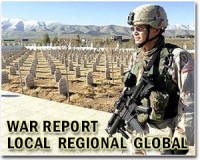| . |  |
. |
Manila (AFP) Feb 13, 2011 The Philippine government and communist rebels will begin peace talks in Norway this week, but analysts say recent deadly clashes show there is no chance of a quick end to the decades-long insurgency. After a breakthrough last month in which the two sides agreed to negotiate for the first time in six years, President Benigno Aquino's administration voiced hope that the conflict would be over by 2014. "Our most optimistic projection is that... substantive agreements can be reached in 18 months' time and peace achievable in three years," chief government negotiator Alexander Padilla said on Friday before flying to Oslo. But less than a week after the foes agreed to meet, communist rebels killed five policemen in a well-planned ambush in a northern Philippine town. The assault marked the start of an offensive across the country that the military said left at least 14 people dead ahead of the week-long talks that will begin in Oslo on Tuesday. "Certainly, it is a sign of bad faith on their part," military spokesman Brigadier General Jose Mabanta told AFP when asked about the communists' intentions in carrying out the assaults. The Communist Party of the Philippines and its armed wing, the New People's Army (NPA), launched their uprising in 1969, and tens of thousands of people have been killed during the conflict, according to military estimates. About 5,000 NPA rebels are continuing the fight, mainly in the poorest areas of the Philippines, earning funds primarily through extortion from businesses and provincial politicians. While their goal of seizing control of the country through an armed revolution remains as elusive as ever, their recent offensive shows they remain a formidable threat in the countryside. Since 1986, successive Philippine administrations have held peace talks with the communists through their Netherlands-based political arm, the National Democratic Front (NDF), but all the negotiations have proved fruitless. The last talks, under then-president Gloria Arroyo, were held in 2004. They fell apart after the NDF demanded that the government have the group removed from US and EU lists of "terrorist" organisations. Pointing to a reason for optimism about the upcoming negotiations, Padilla said no conditions had been set by either side. But the founder of the communist insurgency, Jose Maria Sison, said in a statement from his self-imposed exile in Utrecht that the terror list issue remained a priority. "The NDF continues to demand that the (government) withdraw its treasonous acts of having requested the US, EU and other foreign governments to put the CPP, NPA and myself in the so-called terrorist lists," Sison said. Echoing the views of other analysts Rodolfo Mendoza, a retired colonel, said the communists intended to use the talks only to get "political mileage" and they had little intention of ever signing a peace. "They will prolong it. They will talk but there will be no immediate agreement. It will not prosper," said Mendoza, who did intelligence work against the rebels when he was in the military and is now a security analyst. He and other analysts said the differences between the two sides remained too great, with the communists determined to overhaul the country's economic model and railing against endemic corruption by the nation's elite. "The bottom line here is there remain very intractable issues," said Pete Troilo, Manila-based business intelligence director with Pacific Strategies and Assessments, a security research group. "There are very hardline factions within the NDF that will never agree to peace unless the Philippine government gives substantial concessions and that is never going to happen." And while Padilla said the government was hoping to secure a peace by 2014, it was not prepared to accommodate hardline communist positions. "If the agenda stalls, if they put in unsolvable demands then we will stop talking," he told AFP.
Share This Article With Planet Earth
Related Links
 Israel-Palestinian accord possible amid turmoil: Barak
Israel-Palestinian accord possible amid turmoil: BarakUnited Nations (AFP) Feb 10, 2011 Israel and the Palestinians should take advantage of turmoil in the Middle East to complete a peace accord, Israel's Defence Minister Ehud Barak said Thursday. Barak met with UN Secretary General Ban Ki-moon at the UN headquarters as Egypt's President Hosni Mubarak gave a speech in which he vowed to stay on until elections in September. The Egypt troubles were raised but Barak refused to ... read more |
|
| The content herein, unless otherwise known to be public domain, are Copyright 1995-2010 - SpaceDaily. AFP and UPI Wire Stories are copyright Agence France-Presse and United Press International. ESA Portal Reports are copyright European Space Agency. All NASA sourced material is public domain. Additional copyrights may apply in whole or part to other bona fide parties. Advertising does not imply endorsement,agreement or approval of any opinions, statements or information provided by SpaceDaily on any Web page published or hosted by SpaceDaily. Privacy Statement |